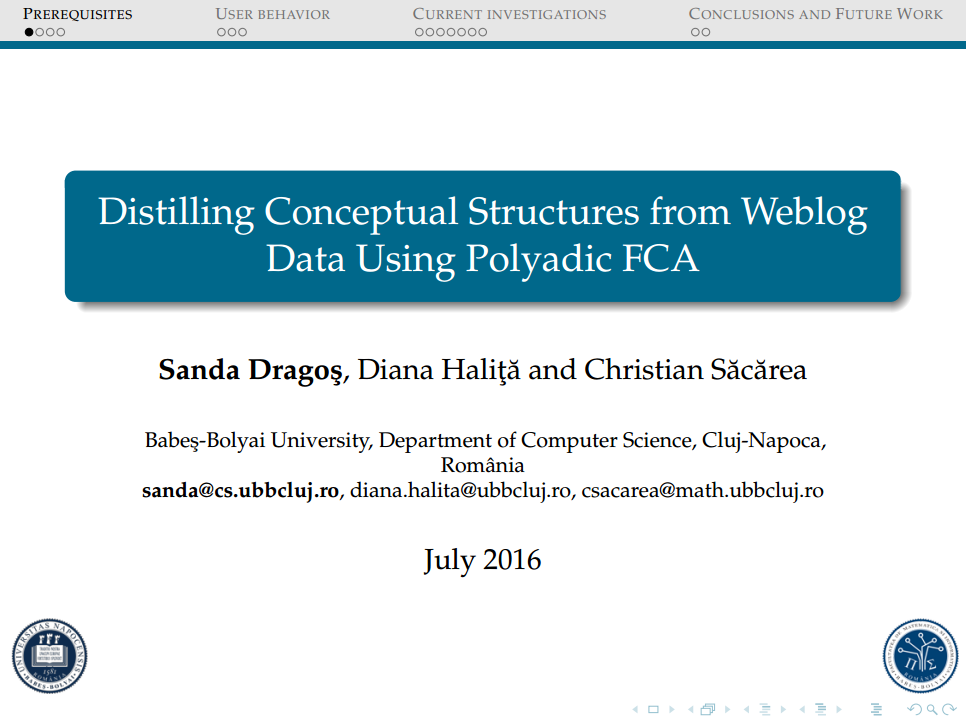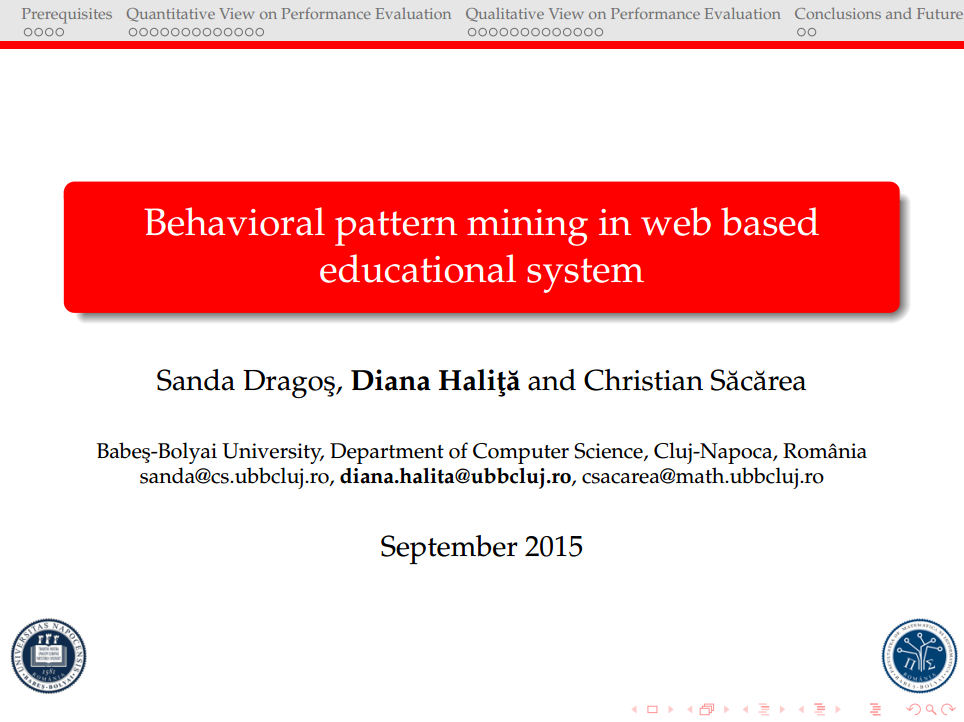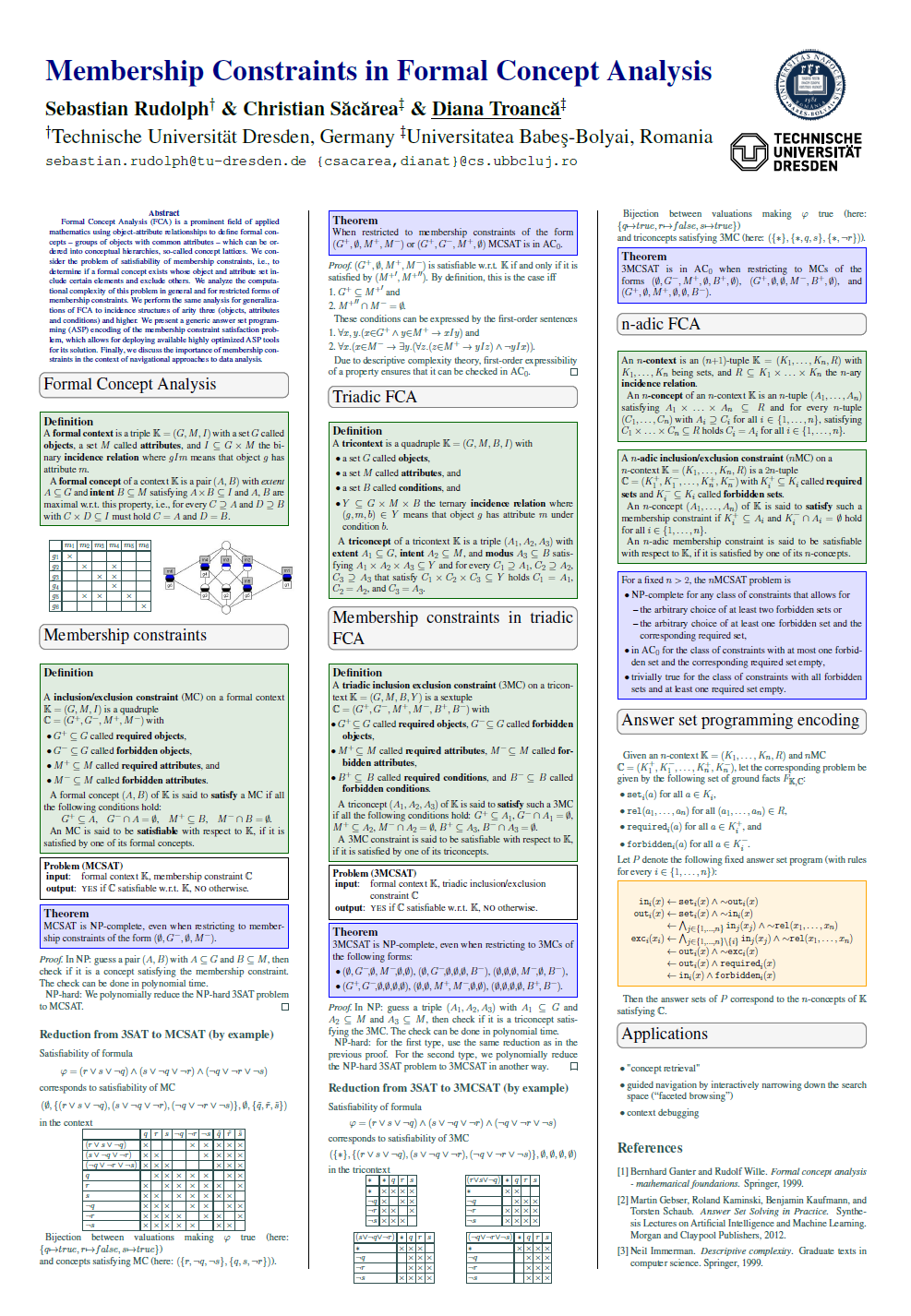Abstract:
Formal Concept Analysis (FCA) is a prominent field of applied mathematics which is closely related to knowledge discovery, processing and representation. We consider the problem of distilling relevant conceptual structures from weblog data, more precisely, we investigate users’ behavioral patterns in an web based educational platform by using n-adic FCA (n=3,n=4). We focus in our research on log data gathered from e-learning platforms. Such systems are particularly interesting, since user’s behavioral patterns are closely related to their academic performance. We investigate user’s behavior by using similarity measures of various visited page chains. We exemplify the methods we have developed on a locally developed e-learning platform called PULSE. Data gathered from weblogs have been preprocessed and conceptual landscapes of knowledge have been built using FCA. Triadic FCA (3FCA) is used to investigate correlations between similar page chains and the time granule when a certain pattern occurs. Finally, we employ tetradic FCA (4FCA) to compare web usage patterns wrt. temporal development and occurence. As far as we know, this is the first attempt to use 4FCA in web usage mining.
About
Activities
FCA Tools Bundle
FCA Tools Bundle is a website containing a collection of tools that can be used for conceptual structure analysis.
Research Seminars - Academic year 2017-2018
Usually the meetings are held in 406 room, 58-60 Teodor Mihali street, each Monday at 14:00.
Publications
Keywords:
Web usage mining, Behavioral patterns, Formal Concept Analysis, Similarity measures
Behavioral pattern mining in web based educational system
Abstract:
This paper presents a variety of methods that we have used and published along the years in order to investigate users behavioral patterns within e-learning systems. We have used both quantitative and qualitative methods, each offering a different level of insight. In this paper we would like to present how an investigation can benefit from using all of those methods. We start by using quantitative methods that provide us an overall perspective, from which we can focus on specific segments of data that represent points of interest on which we apply qualitative methods that provide a more detailed perspective. Therefore, we begin our evaluation by using web analytics and advance towards the state of the art concept data analysis methods, like Formal Concept Analysis. The investigation has been conducted on a locally developed e-learning platform called PULSE. However, these methods can be applied to any other e-learning platform.
Keywords:
Electronic learning, Data mining, Instruments, Navigation, Formal concept analysis, Data visualization, Force
Attractors in Web Based Educational Systems. A Conceptual Knowledge Processing Grounded Approach
Abstract:
Users behavioral patterns are one of the main research directions in web usage mining. Web based educational systems are particularly interesting since behavioral patterns are closely related to educational performance. In this paper we focus on attractors in web based educational systems, i.e., qualitative specific behavioral patterns to which users adhere over time. The research has been conducted on a locally developed e-learning platform called PULSE. Data gathered from weblogs have been preprocessed and conceptual landscapes of knowledge have been built using Formal Concept Analysis. Users behavioral patterns have been detected herefrom, or by moving ahead a triadic view. Triadic concepts enabled us to detect unstructured attractors, while conceptual hierarchies and triadic concept sets made possible to investigate the educational attractors and to derive valuable knowledge about bundle of users and their behavior related to their educational performance.
Keywords:
Web usage mining, Behavioral patterns, Formal concept analysis, Triadic formal concept analysis
Membership Constraints in Formal Concept Analysis
Abstract:
Formal Concept Analysis (FCA) is a prominent field of applied mathematics using object-attribute relationships to define formal concepts – groups of objects with common attributes – which can be ordered into conceptual hierarchies, so-called concept lattices. We consider the problem of satisfiability of membership constraints, i.e., to determine if a formal concept exists whose object and attribute set include certain elements and exclude others. We analyze the computational complexity of this problem in general and for restricted forms of
membership constraints. We perform the same analysis for generalizations of FCA to incidence structures of arity three (objects, attributes and conditions) and higher. We present a generic answer set programming (ASP) encoding of the membership constraint satisfaction problem, which allows for deploying available highly optimized ASP tools for its solution. Finally, we discuss the importance of membership constraints in the context of navigational approaches to data analysis.
Keywords:
Formal Concept Analysis, membership constraints, answer set programming
Towards a Navigation Paradigm for Triadic Concepts
Abstract:
The simple formalization and the intuitive graphical representation are main reasons for the growing popularity of Formal Concept Analysis (FCA). FCA gives the user the possibility to explore the structure of data and understand correlations and implications in the data set. Recently, triadic FCA (3FCA) has become increasingly popular, but exploring triadic conceptual landscapes is not easy, especially because of the less immediate structure of the space of triadic concepts. Even more, available graphical representations of trilattices are barely intelligible and hard to obtain even for small data sets. Driven by practical requirements, we propose a new navigation paradigm for triadic conceptual landscapes based on a neighborhood notion arising from appropriately defined dyadic concept lattices. Understanding the corresponding reachability relation gives also new theoretical insights about the behavior of
triadic concepts and the corresponding triadic data sets.
Keywords:
Formal Concept Analysis, correlations, implications, triadic FCA, conceptual landscapes, reachability relation
Activities
FCA Tools Bundle
FCA Tools Bundle is a website containing a collection of tools that can be used for conceptual structure analysis.Research Seminars - Academic year 2017-2018
Usually the meetings are held in 406 room, 58-60 Teodor Mihali street, each Monday at 14:00.
Keywords:
Web usage mining, Behavioral patterns, Formal Concept Analysis, Similarity measures
Behavioral pattern mining in web based educational system
Abstract:
This paper presents a variety of methods that we have used and published along the years in order to investigate users behavioral patterns within e-learning systems. We have used both quantitative and qualitative methods, each offering a different level of insight. In this paper we would like to present how an investigation can benefit from using all of those methods. We start by using quantitative methods that provide us an overall perspective, from which we can focus on specific segments of data that represent points of interest on which we apply qualitative methods that provide a more detailed perspective. Therefore, we begin our evaluation by using web analytics and advance towards the state of the art concept data analysis methods, like Formal Concept Analysis. The investigation has been conducted on a locally developed e-learning platform called PULSE. However, these methods can be applied to any other e-learning platform.
Keywords:
Electronic learning, Data mining, Instruments, Navigation, Formal concept analysis, Data visualization, Force
Attractors in Web Based Educational Systems. A Conceptual Knowledge Processing Grounded Approach
Abstract:
Users behavioral patterns are one of the main research directions in web usage mining. Web based educational systems are particularly interesting since behavioral patterns are closely related to educational performance. In this paper we focus on attractors in web based educational systems, i.e., qualitative specific behavioral patterns to which users adhere over time. The research has been conducted on a locally developed e-learning platform called PULSE. Data gathered from weblogs have been preprocessed and conceptual landscapes of knowledge have been built using Formal Concept Analysis. Users behavioral patterns have been detected herefrom, or by moving ahead a triadic view. Triadic concepts enabled us to detect unstructured attractors, while conceptual hierarchies and triadic concept sets made possible to investigate the educational attractors and to derive valuable knowledge about bundle of users and their behavior related to their educational performance.
Keywords:
Web usage mining, Behavioral patterns, Formal concept analysis, Triadic formal concept analysis
Membership Constraints in Formal Concept Analysis
Abstract:
Formal Concept Analysis (FCA) is a prominent field of applied mathematics using object-attribute relationships to define formal concepts – groups of objects with common attributes – which can be ordered into conceptual hierarchies, so-called concept lattices. We consider the problem of satisfiability of membership constraints, i.e., to determine if a formal concept exists whose object and attribute set include certain elements and exclude others. We analyze the computational complexity of this problem in general and for restricted forms of
membership constraints. We perform the same analysis for generalizations of FCA to incidence structures of arity three (objects, attributes and conditions) and higher. We present a generic answer set programming (ASP) encoding of the membership constraint satisfaction problem, which allows for deploying available highly optimized ASP tools for its solution. Finally, we discuss the importance of membership constraints in the context of navigational approaches to data analysis.
Keywords:
Formal Concept Analysis, membership constraints, answer set programming
Towards a Navigation Paradigm for Triadic Concepts
Abstract:
The simple formalization and the intuitive graphical representation are main reasons for the growing popularity of Formal Concept Analysis (FCA). FCA gives the user the possibility to explore the structure of data and understand correlations and implications in the data set. Recently, triadic FCA (3FCA) has become increasingly popular, but exploring triadic conceptual landscapes is not easy, especially because of the less immediate structure of the space of triadic concepts. Even more, available graphical representations of trilattices are barely intelligible and hard to obtain even for small data sets. Driven by practical requirements, we propose a new navigation paradigm for triadic conceptual landscapes based on a neighborhood notion arising from appropriately defined dyadic concept lattices. Understanding the corresponding reachability relation gives also new theoretical insights about the behavior of
triadic concepts and the corresponding triadic data sets.
Keywords:
Formal Concept Analysis, correlations, implications, triadic FCA, conceptual landscapes, reachability relation




